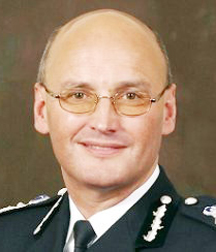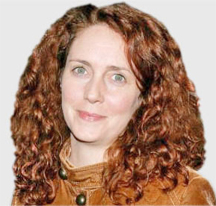LONDON, (Reuters) – A phone-hacking scandal centred on Rupert Murdoch’s News Corp cost Britain’s top policeman his job and renewed questions yesterday about Prime Minister David Cameron’s judgment.

In another major development in a scandal that has shaken Britons’ faith in the police, press and political leaders, detectives arrested Rebekah Brooks, former head of News Corp’s British newspaper arm, on suspicion of intercepting communications and corruption.
The flame-haired Brooks, who once edited the News of the World tabloid, was released on bail at midnight yesterday, about 12 hours after she went to a London police station to be arrested, her spokesman said. Brooks has denied any wrongdoing.
Analysts said the gathering pace of heads rolling had turned up the heat on Cameron and Murdoch over their handling of the scandal, with the media tycoon due to be questioned by parliament in a possible showdown tomorrow.
The News of the World, which published its final edition a week ago, is alleged to have hacked up to 4,000 phones including that of murdered 13-year-old Milly Dowler, sparking a furore that forced Murdoch to close the paper and drop a $12 billion plan to buy all of highly profitable broadcaster BSkyB .

Paul Stephenson, London’s police commissioner, quit yesterday in the face of allegations that police officers had accepted money from the paper and had not done enough to investigate hacking charges that surfaced as far back as 2005.
The trigger for his resignation was revelations he had stayed at a luxury spa at which Neil Wallis, a former News of the World deputy editor, was a public relations adviser. Wallis, also employed by police as a consultant, was arrested last week in connection with the hacking scandal.
“I had no knowledge of the extent of this disgraceful practice (of phone-hacking),” Stephenson said in a televised statement.
Brooks quit on Friday as chief executive of News International, the British unit of Murdoch’s News Corp, but has denied she knew of the alleged widespread nature of the hacking.
The scandal has raised concerns not only about unethical media practices but about the influence Murdoch has wielded over British political leaders and allegations of cosy relationships between some of his journalists and police.
Cameron has come under fire for his friendship with Brooks and for employing former News of the World editor Andy Coulson as his press secretary after Coulson quit the paper in 2007 following the jailing of a reporter for phone-hacking.
Tim Bale, politics professor at the University of Sussex, said: “It has become almost a crisis of governance in the United Kingdom. (Stephenson’s) resignation takes us beyond a few bad apples … There is a sense of things sliding out of control.
“The actual text of (Stephenson’s) statement pointing to parallels between himself and the prime minister is quite breathtaking. It won’t make Mr Cameron do the same thing, but it reminds people once again of the Coulson problem.”
The opposition Labour Party, which has capitalised on Cameron’s discomfort, seized on Stephenson’s reference to the Coulson appointment in his resignation speech.
“It is striking that Sir Paul Stephenson has taken responsibility and answered questions about the appointment of the deputy editor of the News of the World,” Labour home affairs spokeswoman Yvette Cooper said.
“The prime minister still refuses to recognise his misjudgment and answer questions on the appointment of the editor of the News of the World at the time of the initial phone hacking investigation.”
Cameron took office last May at the head of a Conservative-led coalition that has made cleaning up the public finances its priority.
GLOBAL CONCERN
With politicians from Australia to the United States demanding to know if similar abuses occurred elsewhere in Murdoch’s global media business, the 80-year-old has been forced on the defensive and the position of his son James as heir-apparent has been called into question.
Brooks and Rupert and James Murdoch are due to be questioned by parliament tomorrow, including over reports that News International misled legislators during earlier hearings.
But Brooks’s spokesman said her arrest might cast doubt on whether she could appear before politicians.
“Anything that will be said at the select committee hearing could have implications for the police inquiry,” said David Wilson, adding Brooks was “shocked” by the arrest.
The Financial Times reported yesterday that Labour legislator Tom Watson had written to the Serious Fraud Office (SFO) asking it to investigate payments he alleged were made by News Corp to cover up the scandal.
A SFO spokesman said he did not know if the letter had been received but that the agency would take such a request “very seriously”.
Brooks became the focus of widespread anger over the phone-hacking scandal but was initially protected by Murdoch, who guided her rise through the male-dominated world of UK tabloid journalism to become editor of the News of the World in 2000 and the Sun’s first female editor in 2003.
But her initial refusal to quit, and a faltering speech she delivered when she closed the News of the World and ended the careers of dozens of colleagues, prompted some journalists to say she was out of touch.
In 2003, Brooks said the News of the World had made payments to police in the past but could not remember any specific examples.
Murdoch, who some media commentators say at first misjudged the strength of public anger, published apologies in several British newspapers at the weekend.
He lost another loyal executive on Friday when Les Hinton, another former head of his UK newspaper business, resigned as chief executive of Murdoch’s Dow Jones & Co which publishes The Wall Street Journal.









